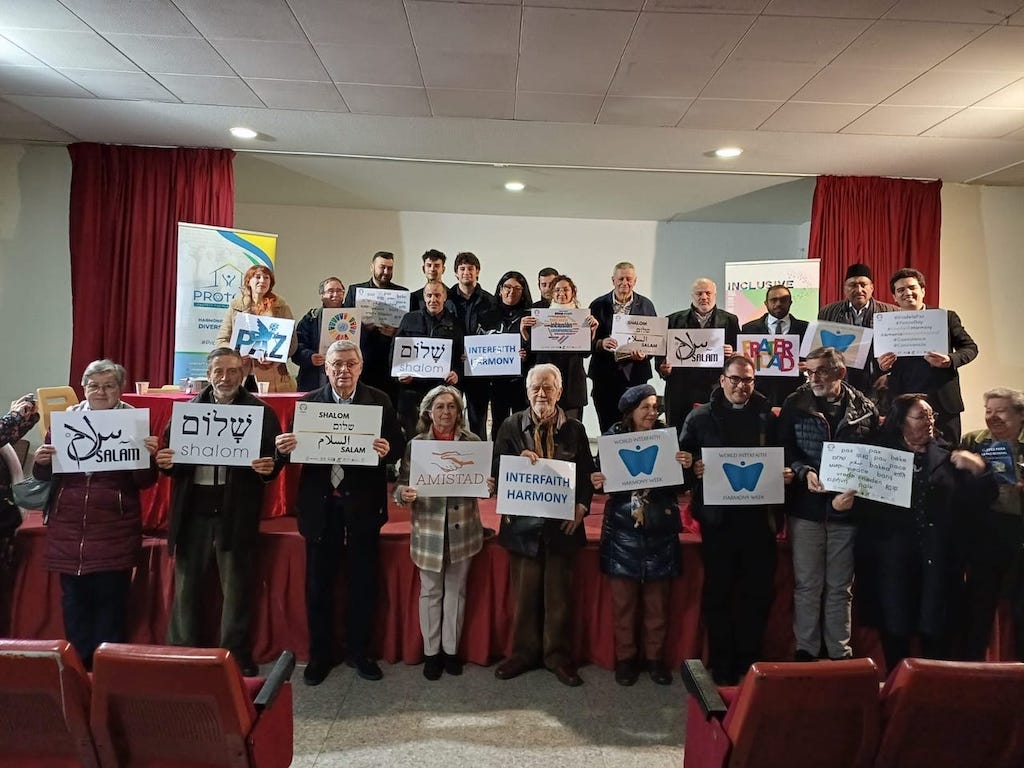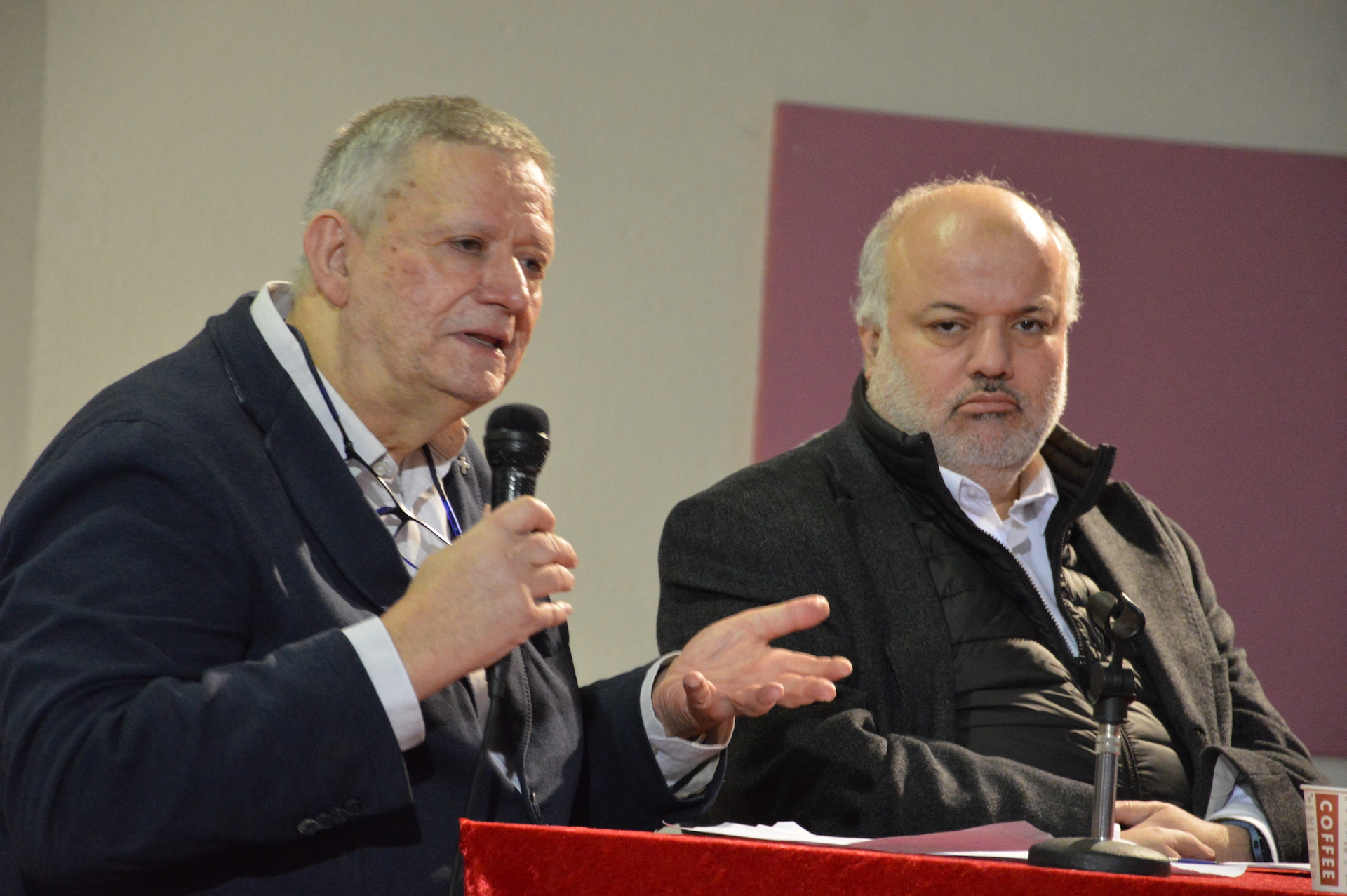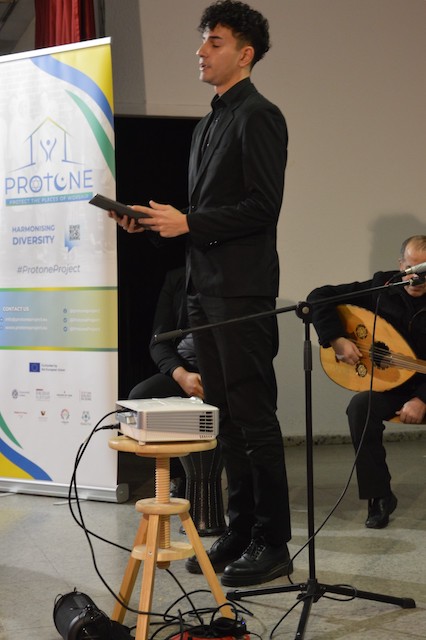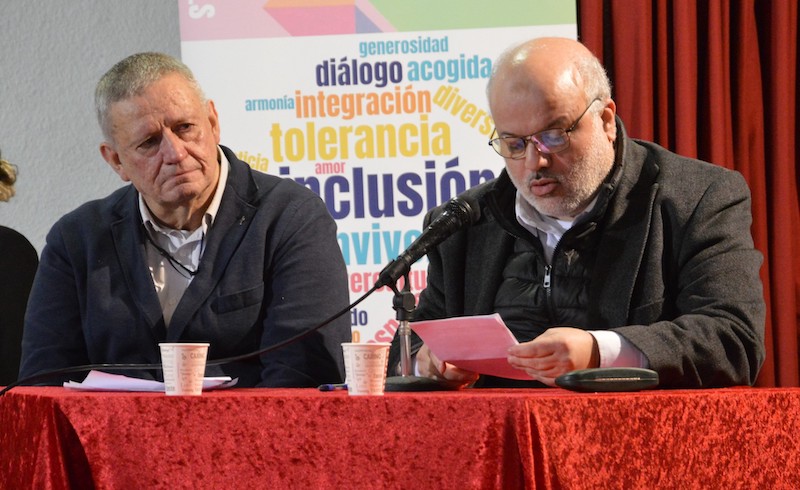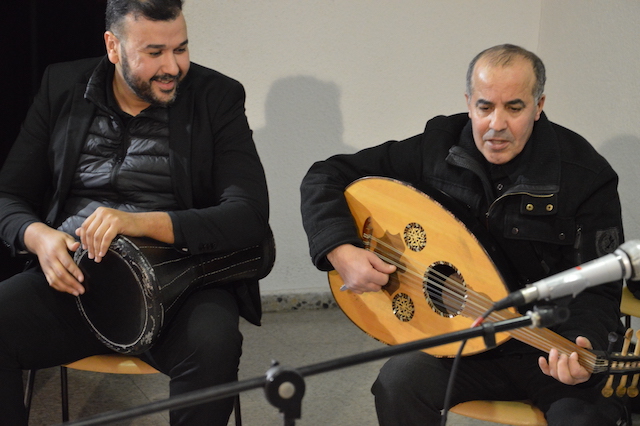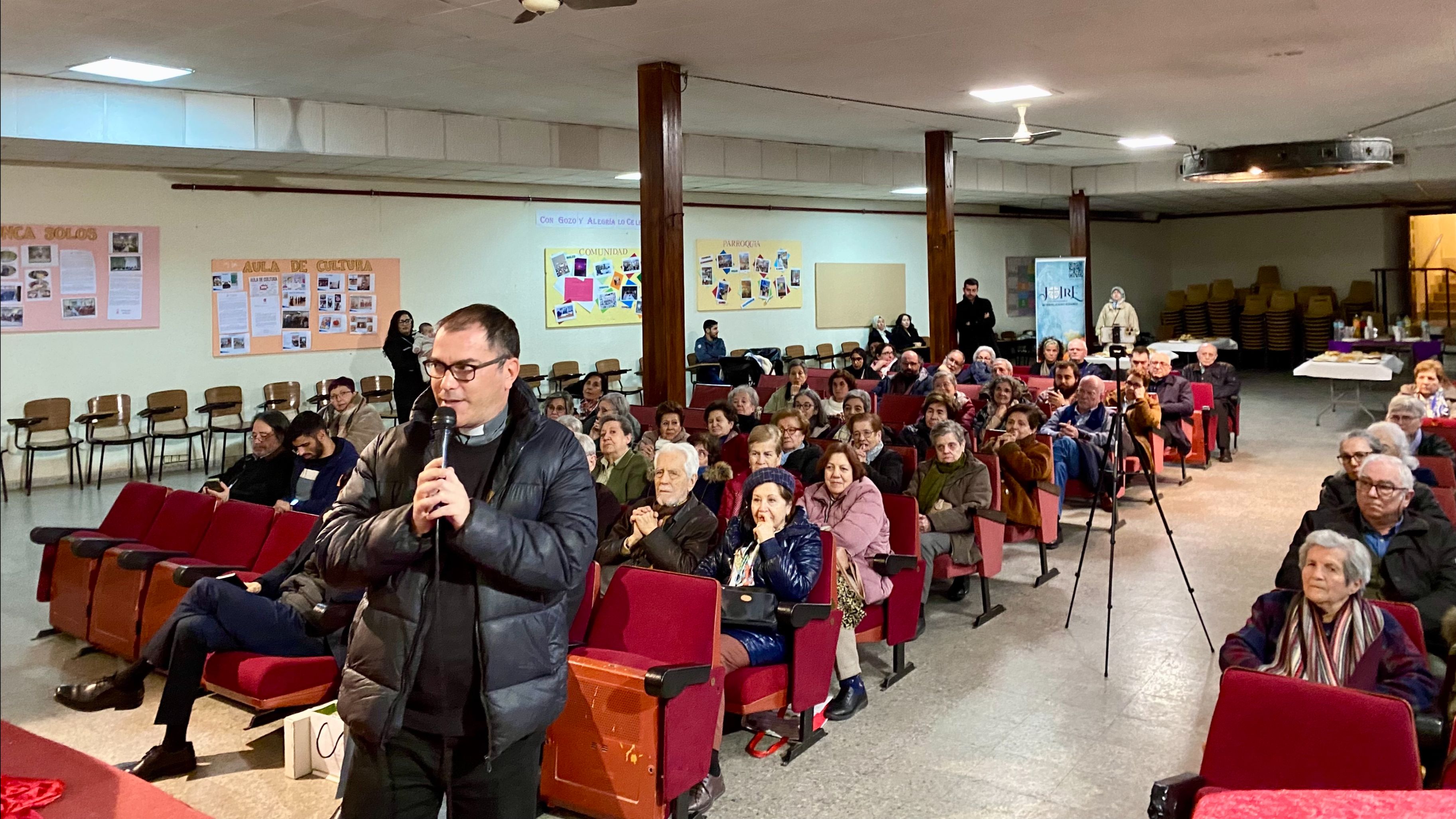Interreligious Meeting / What do religions bring to the migration experience?
On Tuesday, February 4, 2025, the interfaith event titled "What Do Religions Bring to the Migration Experience?" took place at the Parish Nuestra Señora de las Delicias in Madrid. The event was organised by the Delegation for the Pastoral Care of Human Mobility of the Archdiocese of Madrid, the Delegation for Ecumenism and Interreligious Dialogue of the Archdiocese of Madrid, and Arco Forum. It was held in commemoration of the International Day of Human Fraternity and as part of the World Interfaith Harmony Week. The event provided a space for reflection, dialogue and fraternity, exploring the role of religious traditions in supporting migrants and fostering social cohesion. It featured a round table discussion with religious and civil society representatives, musical performances by the Joven Ensemble Interreligioso Español - JOIRE (Spanish Youth Interfaith Ensemble) and a closing fraternal dinner. > Opening Remarks The event was moderated by José Luis Segovia, Pastoral Vicar of the Archdiocese of Madrid, who opened the session by emphasising the interfaith nature of the gathering and the importance of fraternity among different religious traditions. Among the notable attendees were Fernando Redondo Pavón, Director of the Department of Migrations of the Subcommittee for Migrations and Human Mobility of the Spanish Episcopal Conference, and Musabah Saeed Al Katibi, Director General of the Foundation for Islamic Culture and Religious Tolerance (FICRT). Segovia highlighted that all religious traditions share a belief in an Absolute Being characterised by compassion, mercy and kindness, which forms the foundation for solidarity with migrants. He noted that human migration has been a central theme in the sacred texts of many religions, appearing in narratives of exodus, exile, and pilgrimage. He stressed that this common heritage reinforces the moral obligation of all faiths to welcome and protect migrants. He also addressed the challenges faced by displaced persons today, emphasising the urgent need for dialogue and collaboration among different religious communities to defend their rights. > Round Table Discussion The round table brought together four distinguished speakers, each representing a different perspective on the relationship between religion and migration: Rufino García – Delegate for the Pastoral Care of Human Mobility of the Archdiocese of Madrid (Catholic representative). Mohamed Ajana – Secretary of the Islamic Commission of Spain (Muslim representative). Jana Baena – Secretary of the Masorti Bet-El Community of Madrid (Jewish representative). Temir Naziri – Executive Director of Arco Forum (civil society representative). Each speaker provided insights into how faith traditions contribute to the migration experience, helping migrants find strength, resilience and support in their new environments. Rufino García (Catholic Perspective) García structured his intervention in two parts: A theoretical reflection on hospitality in religious traditions, emphasising how Christianity, Judaism, and Islam share a history of migration, with Biblical and Quranic references highlighting hospitality as a sacred duty. He referenced the Abu Dhabi Declaration on Human Fraternity and the House of the Abrahamic Family project as contemporary examples of interfaith cooperation in welcoming migrants. A practical perspective, sharing experiences from his pastoral work with migrants in Madrid. He recounted stories of migrants at the Centro de Internamiento de Extranjeros (Foreigners' Internment Centres) in Aluche, Madrid, and emergency shelters, noting how faith provides them with hope and perseverance despite adversity. He concluded with a moving anecdote about a Muslim migrant who, after receiving help from a Catholic parish, expressed his gratitude, stating that his faith remained Islamic but that he would never forget the hospitality of the Christian community. Mohamed Ajana (Islamic Perspective) Ajana highlighted that migration is a complex phenomenon that can be analysed from economic, cultural, and security perspectives, but he stressed the critical role of religion in fostering social cohesion and ethical responsibility. From an Islamic viewpoint, he underscored that migration has strong ethical, humanitarian and human rights dimensions. He referenced: The migration of early Muslims to Ethiopia (615 CE) as an example of interfaith hospitality. The Hijrah (622 CE) as a lesson in adaptation, resilience and community-building. Ajana also spoke about the role of mosques and Islamic centres in providing spiritual and emotional support to migrants, fostering a sense of belonging despite the challenges of displacement. He concluded by emphasising that Islam, like other religions, promotes peaceful coexistence, mutual respect and cooperation for the common good. Jana Baena (Jewish Perspective) Baena focused on the importance of interfaith gatherings in promoting understanding and unity. She shared the experience of the Masorti Bet-El Community of Madrid, which includes members from Latin America and Eastern Europe, and discussed how migration influences the Jewish sense of identity and belonging. She introduced the Jewish concept of tzedakah (justice, charity, righteousness, integrity), which guides the community’s commitment to assisting migrants. She also shared details of the "En-Red-Ando" initiative, a women's support network that organises monthly meetings to address migration challenges and build social and emotional support systems for newcomers. Temir Naziri (Civil Society Perspective) As a Muslim migrant of Tajik origin, Naziri shared his personal migration experience, emphasising the role of places of worship in providing support and integration for migrants. He addressed the misconceptions surrounding migration and called for greater interfaith dialogue to challenge stereotypes and misinformation. Naziri also presented Arco Forum’s projects that promote inclusion through intercultural and interfaith activities, including: Workshops on migration and refugees. Community football matches promoting social cohesion. Intercultural culinary events (cooking workshops). Visits to religious and cultural heritage sites. Additionally, he introduced Arco Forum’s current initiative to protect places of worship through interfaith dialogue under the Protone Project, emphasising that religious spaces serve as both places of prayer and vital community support centres for migrants. Music and Cultural Contributions Throughout the event, the Spanish Youth Interfaith Ensemble (JOIRE) provided musical interludes representing Christian, Jewish, and Muslim traditions, reinforcing the theme of unity in diversity. The ensemble, led by Musical Director Julio Maroto, featured performances of: Ave María (William Gómez) – Yaser El Maataoui (Tenor) & Ramona Vergoti (Piano). Tala’ al Badru ‘Alayna (Islamic traditional) – Yaser El Maataoui (Vocals), Abdullah Afazaz (Ud), Hamza Chaoui (Percussion). Eli Eli (Jewish traditional) – Mercedes Benzaquén & Lior Stofenmacher (Vocals), Ramona Vergoti (Piano). Ode to Joy – Final performance symbolising unity and fraternity. Conclusion and Closing The event concluded with a fraternal dinner, featuring culinary contributions from participants, further fostering a spirit of hospitality and cultural exchange. Fr. Aitor de la Morena, Episcopal Delegate for Ecumenism and Interreligious Dialogue (Archdiocese of Madrid), gave the closing remarks, inviting attendees to continue fostering fraternity and promoting interfaith dialogue to combat social polarisation. Final Reflections The event was not just a round table discussion—it was a lived experience of unity, highlighted by the diverse cultural expressions shared through music and food, creating an inclusive space for dialogue, reflection and cultural exchange. It highlighted how faith and religious communities play a fundamental role in accompanying migrants, offering them spiritual, emotional and material support. This gathering reinforced the importance of interfaith cooperation in building a more just, welcoming and harmonious society. The organisers would like to express their gratitude to all participants, speakers, the hosting parish and the musical ensemble JOIRE for their contributions to this impactful gathering. Their collective efforts continue to build bridges of understanding and fraternity within an increasingly diverse society. Video Documentation and Public Engagement A video recording of the event was uploaded to YouTube, generating significant engagement and reach beyond the physical event. Here are the key performance insights: Total Views: 311 Unique Viewers: 226 Watch Time: 16.5 hours Impressions: 1,919 This video serves as a valuable resource for those who could not attend the event in person, allowing a broader audience to engage with the topics discussed. Event Outreach and Further Engagement In addition to the in-person participation and media coverage, the event’s impact extended through digital communication efforts. A dedicated newsletter chronicle summarising the event was sent to a total of 1,399 recipients via the Mailchimp platform. The newsletter provided a comprehensive overview of the round table discussion, musical performances, and closing reflections, along with links to related articles, media coverage and the full video of the event. Beyond email distribution, the detailed event report was also shared through WhatsApp contact networks, significantly expanding its reach. Including WhatsApp contacts, the chronicle of the event has directly reached approximately 2,400 people. These insights were gathered through Mailchimp’s analytics, which track recipient interactions, and through direct outreach assessments via WhatsApp distribution. This data highlights the event’s strong digital reach, demonstrating significant engagement within interfaith and migration-focused networks. The newsletter, along with social media posts and media publications, that can be accessed below, played a key role in amplifying the discussion and fostering continued engagement on the topics explored during the event.

